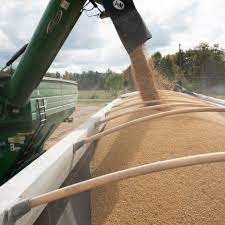Cutting biofuels can help avoid global food shock from Ukraine war.
The war in Ukraine has already caused food prices to shoot up as global markets anticipate a loss of wheat and maize exports from one of the world’s largest producers of these crops.
But Europe and the US could more than compensate for the loss of Ukraine’s exports by diverting crops destined to be made into biofuels into food production instead. This would bring food prices down and help prevent a major global food shock.
On 9 March, Ukraine banned most food exports to try to ensure that its people don’t go hungry as Russian forces invade.
🔥 What about we co-host a webinar? Let's educate, captivate, and convert the biofuels economy!
Biofuels Central is the global go-to online magazine for the biofuel market, we can help you host impactful webinars that become a global reference on your topic and are an evergreen source of leads. Click here to request more details
Food prices were already at the highest levels for 40 years, says Matin Qaim at the University of Bonn in Germany. This is for many reasons, including poor harvests because of extreme weather driven by global warming.
Quickly increasing the supply of food crops is difficult. But a large proportion of food crops aren’t eaten but converted to biofuels. Globally, 10 per cent of all grain is turned into biofuel, says Qaim.
In the US, a third of the maize grown is converted into ethanol and blended into petrol. Around 90 million tonnes is used for ethanol, nearly double the 50 million tonnes exported by Ukraine and Russia, says Qaim.
In the European Union, 12 million tonnes of grain, including wheat and maize, is turned into ethanol, Qaim says, around 7 per cent of the bloc’s production.
The EU also produces large quantities of biodiesel. It turns 3.5 million tonnes of palm oil alone into biodiesel, says Qaim.
Qaim said:
That’s almost the amount of sunflower oil coming out of Ukraine and Russia.
Governments have the power to change this, says Ariel Brunner at Birdlife International.
Ariel Brunner:
Because the biofuel market is entirely driven by subsidies, you can unplug it literally with the stroke of a pen.
If the US and Europe were to decrease their use of ethanol made from grain by 50 per cent, they would effectively replace all of Ukraine’s exports of grain, Tim Searchinger at Princeton University has calculated in response to a question from New Scientist.
“This is one of the few really quick things we can do,” says Brunner. “We are literally burning a hell of a lot of food.”
One country has already done just this. On 11 March, the Czech Republic ended its mandate requiring ethanol to be blended with petrol. It did this to reduce the costs of fuel rather than food, but Brunner is calling for other countries to follow suit.
Jason Hill at the University of Minnesota in St Paul:
“It absolutely would make a difference. It would begin to relieve prices immediately.”
“It would also send a signal that can be acted on immediately by farmers. Northern hemisphere farmers are deciding now what to plant.”
The US Environmental Protection Agency has the power to waive the requirement to blend ethanol into fuels, says Hill.
“The EPA could very quickly send a signal that ethanol is not needed.”
Temporarily halting biofuel mandates wouldn’t be popular with farmers. The powerful agrobusiness lobby in the US is currently demanding the opposite, that biofuel production is increased in response to the rising oil price, says Hill.
However, only 6 per cent of fuel sold at petrol pumps in the US is ethanol, he says, so changing this either way isn’t going to have a major effect on global oil prices. By contrast, it could have a major effect on food prices.
Highlight:
- The US and Europe can compensate for the loss of Ukraine’s grain exports by scrapping biofuel mandates, helping to avoid a food price shock.
READ the latest news shaping the biofuels market at Biofuels Central
Cutting biofuels can help avoid global food shock from Ukraine war, March 14, 2022








